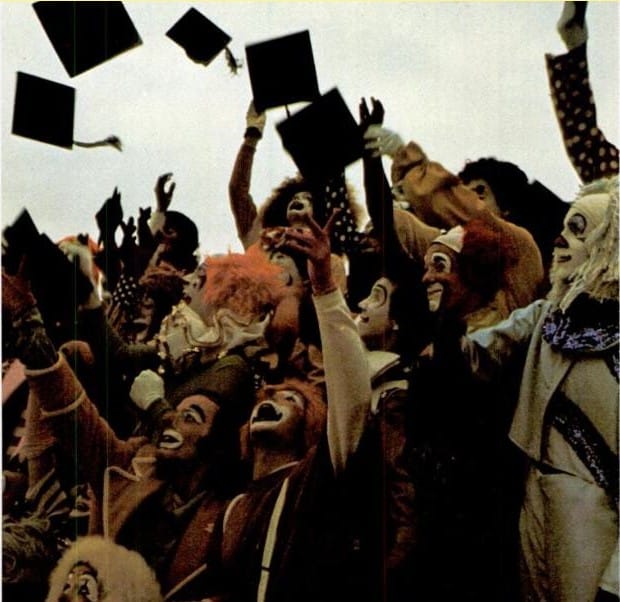Last week I went out to dinner with a group of Chinese friends, some of whom I was meeting for the first time. In between amazing mouthfuls of hot pot, they asked me what it was like to appear on TV shows in China. I tried to explain that while filming shows was a lot of fun, there was still a big issue that made every shoot a little uncomfortable.
“It seems to me that foreigners on television can be either a clown or a scholar,” I told my friends. “China has foreigner clowns, and China has foreigner scholars. But there are no foreign clown scholars.”
In recent months, getting a chance to go on television has given me an option to create an image for myself, and my project, to share with audiences. Unwittingly and without much forethought, I’ve decided to try and be myself onstage. I love making people laugh, being silly, and running with jokes onstage. But my own identity is also closely tied to considering comedy and culture on a deep level. The bifurcation of foreigners into two exclusive roles with entirely different social connotations has lead to conflict both onstage and backstage.
Onstage, this conflict emerges in simple ways. Hosts will praise my singing and dancing even though, from any objective standpoint, it is mediocre at best. This is because by getting onstage at all I already succeed by the standards set for the clown role, and so regardless of the skill of my performance I have entertained the audience. Their praise shoehorns me into the role of a clown.
Backstage, the conflict is more complicated. There seems to be a mental disconnect; a denial that such a role—the clown scholar—is possible. Even when handed perfect opportunities to allow me to play this role for which I am so suited, I am bombarded with requests to change content and play either one role or the other.
For instance, last week I attended a talk show where my Xiangsheng master, Ding Shifu, was the guest of honor. A dozen of his students, representing his life’s work over the last two decades, came to the studio to be onstage or support him from the audience. During this process, a producer for the show slunk nearby, eavesdropping on our conversation, and eventually came and asked one of the students if she would be willing to help film a special part of the show: a side video backstage showing Ding Shifu teaching his students.
It was apparent, however, that this student had been selected for two qualities: she had the lowest language level (1) of any white (2) student Ding Shifu had brought. Perhaps intuiting this, she refused to film the extra segment. The reporter wheedled her for two minutes before I stepped in. “What are you looking to do? Perhaps myself or Satoshi (my Japanese performance partner) could help.”
“It’s like this…” the producer said. “We need a… foreign student… someone who won’t give a… brilliant performance… so we can show Ding Shifu teaching his students basic Chinese.”
“Well, you aren’t likely to find someone like that amongst Ding Shifu’s students,” I said, bristling that my guess about her motives was correct. “We all spent many hours practicing to reach the level of fluency we’re at. I’d be happy to help you film Ding Laoshi teaching us higher level content.” The heads of my fellow players nodded all around.
“That’s no good,” the producer whined. “It won’t be… clear enough that he is teaching you.”
Given a golden chance to show someone being funny AND scholarly, learning a craft that was interesting and challenging, the producer’s mindset was so firmly entrenched in the separation of clowns and scholars that to mix them would yield, in her words, an “unclear” result.
It angered me to be asked so openly to put on a dunce cap and literally slur my words. It frustrated me that the roundabout way the producer thought to pitch her side-segment was still, in my mind, clearly insulting to our effort and our art.
But despite this, I remain convinced that this misappropriation of the talent and energies of the foreign actors in my troupe, and of foreigners in China as a whole, represents a huge opportunity. Americans can do more than teach English; actors can do more than play roles such as “foreign policeman.” China loves seeing foreigners on TV, because they love learning about the world outside China.
This producer won’t give me the go-ahead to be a clown-scholar, but I think that the result that she fears, what she called “un-clarity,” other Chinese will call “discovery,” and the sky is the limit for what Chinese can discover about the lands outside of China if they will listen to what the people of the world have to share.上周,我和一群中国朋友一起出去吃饭,
我告诉我的朋友们,“在我看来,
近几个月来,
在舞台上,这种冲突以简单的方式出现。
在后台,冲突则更为复杂。似乎有这样一种精神分离,
例如,上周我参加了一个脱口秀节目,我的相声老师丁师傅是嘉宾。
然而,很明显,这个学生因两种品质而被选定:
制片人说:“是这样,我们需要一个表现比较一般的外国学生,
我说:“好吧,
制片人发牢骚道:“那样可不好。很明显他正在教授你们。”
既然有这么好的一个机会去展现某人的风趣和博学,
如此公开地被质问抠罪并模糊我的字面意思使我感到非常生气。
但尽管这样,我仍然深信这种对外国人的才能和活力的盗用,
这个制片人不会给我成为小丑学者的先机,


